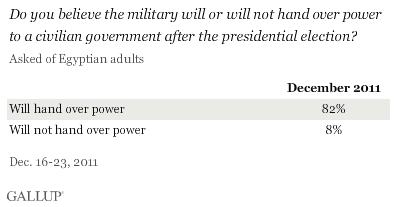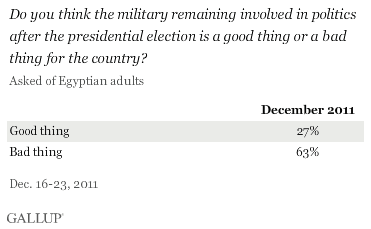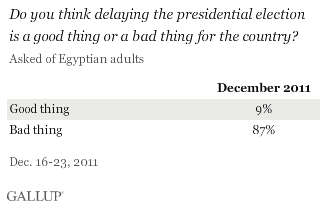LOS ANGELES -- As Egyptians mark the first anniversary of the revolution that toppled their last president, 82% believe that the military will relinquish power to a civilian government after they elect their next president.

Despite continued protests in Tahrir Square since former Egyptian President Hosni Mubarak's overthrow one year ago, 88% of Egyptians still express confidence in the military generally and 89% are confident in the Supreme Council of the Armed Forces (SCAF) specifically. Still, the majority (63%) think it would be bad for the military to remain involved in politics after the presidential election.

Slightly more than one in four Egyptians (27%) believe it is a good thing for the military to remain involved in politics after the presidential election. This suggests there is a sizable minority of Egyptians who see the military as a safety net in the nation's nascent journey with democracy.
Egyptians Universally Reject Any Further Election Delays
Nearly 9 in 10 Egyptians say delaying the presidential election, expected to take place before June 30, 2012, would be a bad thing for their country. This places significant pressure on the military leadership of the country to secure free, fair, and timely elections.

Implications
This first presidential election largely will determine Egypt's future. As the logistics of Egypt's transition face endless debate and scheduling changes, delaying presidential elections might disturb the confidence most Egyptians still express in SCAF. As the country's newly elected parliament convened this week, major political blocs, such as the Muslim Brotherhood, will seek to wrestle more authority from SCAF. Such posturing will give clues to the future balance of power in the governance of the largest Arab nation. Such dynamics will affect the timing and nature of the presidential election as well as the drafting of the country's new constitution. How SCAF handles the changes of the coming months will likely affect how Egyptians perceive it.
The big question still facing leaders, policymakers, and observers is, in the long term, what Egypt will look like post Mubarak. SCAF and the political parties that won the parliamentary election will be contending with protesters to bring out the vote for their bloc and ensure transparency in the election process. Who succeeds and to what extent determines the next chapter in Egypt's bumpy transition.
Survey Methods
Results are based on face-to-face interviews with 1,077 adults, aged 15 and older, and conducted in Dec. 16-23, 2011, in Egypt. For results based on the total sample of national adults, one can say with 95% confidence that the maximum margin of sampling error is 卤3.4 percentage points. The margin of error reflects the influence of data weighting. In addition to sampling error, question wording and practical difficulties in conducting surveys can introduce error or bias into the findings of public opinion polls.
For complete methodology and specific survey dates, please review .
Learn more about how the works.
